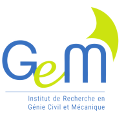ADVANCED SCHOOL – Advanced methods for the characterization of the durability of porous media
Centrale Nantes – November 18th to 20th 2019
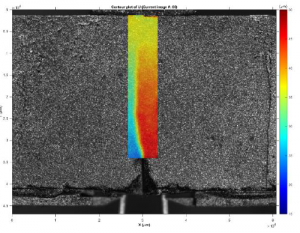
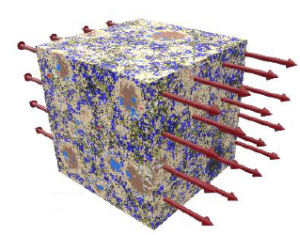
The CNRS Research Group MeGe activities have given major results, particularly in nonlinear poromechanics, in modeling and numerical simulation of couplings in dry granular media, and in homogenization of coupled reactive transfers in cementitious materials. This structuring made it possible to identify three main themes of work in the International Research Group GDRI GEOMECH, which are particularly in line with the major societal challenges that Europe wants to meet in the framework of the Horizon 2020 research program:
Task 1: Catastrophic ruptures and generating mechanisms
Task 2: Safety of storage tanks
Task 3: Energetic geomechanics.
In particular, developing sustainable living spaces, in a context of climate change, requires being able to finely model the behaviour of soils and concrete structures, at various scales, in a context of multi-physical coupling. As we know, the climate change that we are experiencing induces extreme phenomena whose consequences on soils, and in particular on the stability of soils and surface formations, are dangerous. The conclusions of the experts remain unanimous on the fact that these phenomena will amplify, as well in intensity as in terms of frequency. At the same time, controlling the CO2 storage or radioactive waste, as well as the use of alternative energy resources, are issues of global importance for the companies of the future. In line with the research activities of GDRI GEOMECH, this thematic school is proposed to initiate and / or train researchers in the development of new digital and experimental technologies to characterize the behaviour of materials in their (future) environment.
PROGRAMME
The training will begin with theoretical aspects that are mandatory for understanding complex phenomena related to the durability of porous materials. Then she will tackle the more application aspects:
• Mechanics of saturated and unsaturated porous media
• Scaling techniques
• Numerical methods for multiscale modelling of porous media
• Advanced experimental methods for studying the physico-chemo-mechanical behaviour of materials
• Durability of geomaterials and building materials
Practical work will allow the workers to work in groups, to communicate to implement their knowledge and to complete the theoretical courses. Courses will be broken down into a 3-hour session, with a 30-minute break, to stimulate exchanges between teachers and workers. Classes will be held in the morning and afternoon.
The use of remote learning platforms will also accelerate learning. Courses will be held in an interactive room equipped for distance courses for people with reduced mobility. The fees are reduced by two times for distant participation. A weblink will be send to participants to follow in direct the courses.
Invited lecturers
– D. Kondo (Sorbonne Université), ‘Micromechanical modelling for the poro-plasticity of porous media’.
– F. Nicot (IRSTEA), ‘Failure and degradation in particulate media: going down to the micro-scale’.
– G. Sciarra and M. Saad (Centrale Nantes), ‘Mechanics of saturated and unstaturated porous media’.
– P. Turcry (Université de La Rochelle), E. Rozière and A.-L. Fauchille (Centrale Nantes), D. Marot (Université de Nantes), ‘Advanced experimental methods for the study of physico-chemo-mechanical behaviour of materials’.
– S.-Y. Alam (Centrale Nantes), F. Bignonnet and R. Gelet (Université de Nantes), ‘Micromechanical modelling for the durability of porous media’.
– A. Loukili (Centrale Nantes), O. Amiri (Université de Nantes), ‘Durability of geomaterials and building materials’.
| Scientific Committee |
| Pr. Frédéric GRONDIN (GeM – UMR CNRS 6183 – Centrale Nantes) Pr. Djimedo KONDO (IJLRDA – UMR CNRS 7190 – Sorbonne Université) Pr. Ahmed LOUKILI (GeM – UMR CNRS 6183 – Centrale Nantes) Pr. Didier MAROT (GeM – UMR CNRS 6183 – Université de Nantes) Pr. Olivier MILLET (LaSie – Université de La Rochelle) Dr. François NICOT (IRSTEA Chambéry) |
| Organization committee |
| Coordinator: Pr. Frédéric GRONDIN (GeM – UMR CNRS 6183 – Centrale Nantes) Dr. Anne-Laure FAUCHILLE (GeM – UMR CNRS 6183 – Centrale Nantes) Dr. Rachel GELET (GeM – UMR CNRS 6183 – Université de Nantes) Dr. Benoît HILLOULIN (GeM – UMR CNRS 6183 – Centrale Nantes) Pr. Olivier MILLET (LaSie – Université de La Rochelle) |
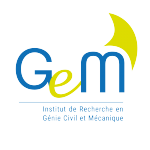 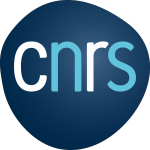 |
| Venue |
| Centrale Nantes 1 rue de la Noë, 44321 Nantes, France http://www.ec-nantes.fr/ |
| Download the flyer |
| NEW ! |
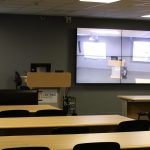
Follow the courses in direct on a website for a special fee of 100 € HT. |
| Registration |
| Registration deadline: October 25th 2019. Withdrawal deadline: November 8th 2019. Fees: • Engineers and junior and senior researchers of public institution: 400 € HT* *100 € HT for distant participation
The registration fees include three fixed lunches, hot beverages, downloadable lecture notes, wi-fi internet access. For CNRS agents, accommodation, lunches and dinners are offered by organizers.
Application forms should be filled on line on Azur Colloque A confirmation e-mail will be sent to applicants. |
| Contact |
| Frédéric GRONDIN frederic.grondin@ec-nantes.fr +33 2 40 37 16 68 |


